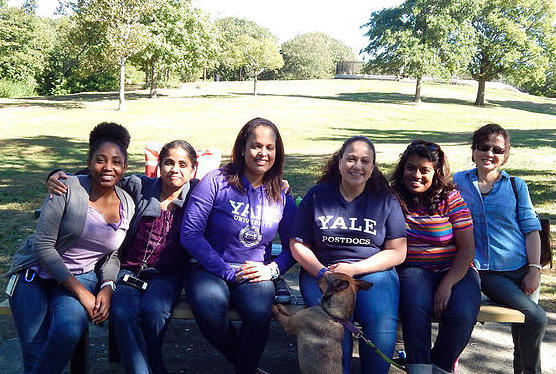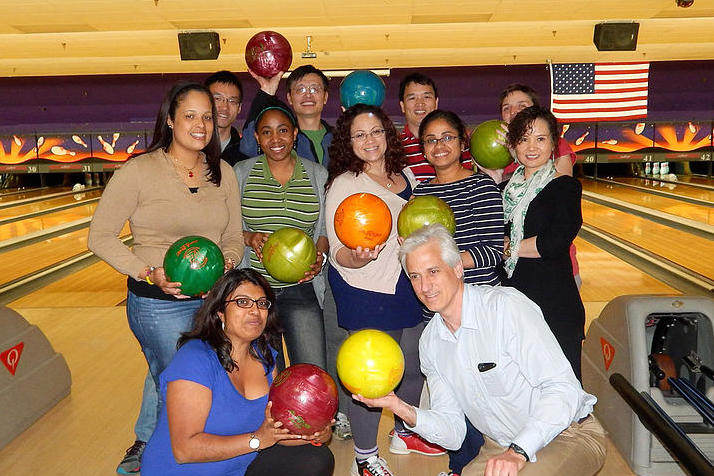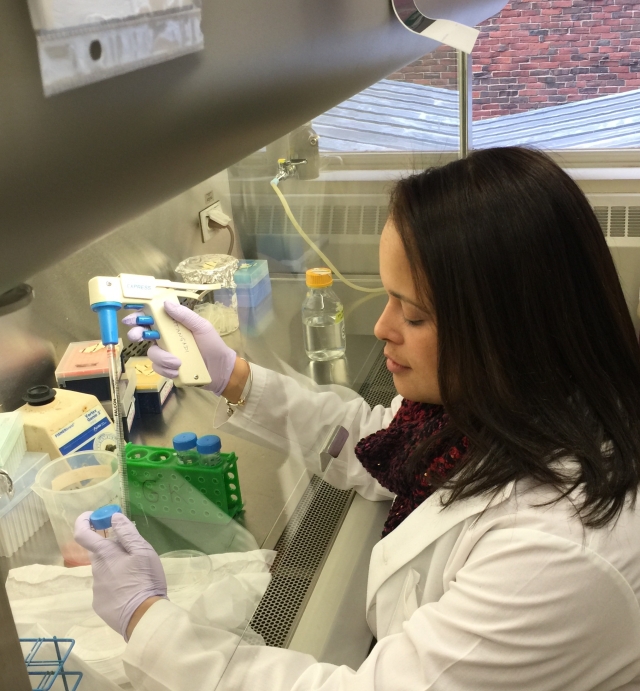My graduate experience conducting research in hematology at Yale University
Submitted by Linette Bosques Nieves on
As a young investigator in biomedical research who is getting ready to complete her Ph.D., I have been looking back at my journey in science and would like to share some insights. By sharing my experience, I hope to support and encourage anyone considering a career in science; it is a long journey but anything is possible with passion, hard work, and perseverance.
My name is Linette Bosques and I am a Ph.D. candidate at Yale University in the Department of Cell Biology. My goal is to devote my career to research and teaching in academia. I am particularly enthusiastic to gain insights into the mechanisms of blood formation in the body. As part of Yale’s Biological and Biomedical Sciences (BBS) graduate training program, my research, in the lab of Dr. Gary Kupfer, is focused on identifying the cellular pathways of red blood cell disorders to better understand red blood cell formation as well as the mechanisms that cause bone marrow failure syndromes.
I was born and raised in Puerto Rico, where I did undergraduate studies in Chemistry at the University of Puerto Rico, Mayagüez. As an undergraduate, I was part of the MARC Program (Maximizing Access to Research Careers), an NIH-funded research training program designed to increase underrepresented minorities in the biomedical sciences by preparing students for PhD training. MARC students are strongly encouraged to seek out summer research opportunities. I was fortunate to participate in summer research programs at the University of Puerto Rico, Medical Sciences Campus, under the guidance of Dr. Loyda Meléndez, and at Yale University, under the guidance of Dr. Lynn Cooley. These summer research experiences were the highlight of my undergraduate career allowing me to gain a deeper appreciation for scientific research. I strongly recommend that students seek out programs like MARC, which provide a supportive environment that promotes exploration of research. Even if you are not part of MARC or RISE (another NIH-funded program to promote research experiences), I strongly encourage students to seek out summer research experiences.

Initially, I was intimidated when it was time for me to leave my island of Puerto Rico and move to such an intellectually rich and challenging environment like Yale. However, the summer research experience at Yale made it evident that it was the perfect place for me to fulfill my dream of becoming a scientist. Currently, I am completing my doctoral thesis in the lab of Dr. Gary Kupfer (Pediatrics Hematology/Oncology), and coming to Yale has been one of the most significant experiences of my life. I am incredibly grateful for the guidance and encouragement I have received from my thesis advisor, which has allowed me to embrace the challenges of graduate school without fear. Furthermore, I greatly appreciate the supportive and collaborative environment at Yale. There have been excellent faculty members available to teach, mentor, and encourage me to become a research scientist, including my thesis committee Drs. Diane Krause, Sherman Weissman, and Jun Lu.
Through my advisor’s academic affiliations, I attend weekly Hematology interest group meetings, where experienced professors and graduate students participate in seminars and present their most recent findings. These seminars serve as a resource for students to explore and learn more about the field of hematology, while also promoting a collaborative environment among the group. Additionally, I attend weekly research-in-progress (known as RIP) sessions organized by the Departments of Cell Biology and Pathology, where students and postdocs are responsible for presenting their research findings.
Furthermore, students from backgrounds that are underrepresented in science have a community within the BBS program, where they are encouraged to participate in a monthly forum to interact in an intimate setting with faculty members who discuss their research, the ups and downs of their careers, as well as provide insight and guidance on how to thrive in graduate school and beyond. This forum allows students to acquire an in-depth overview of the careers and scientific expertise of the principal investigators at Yale.
 I am a strong advocate for Yale as a place where all students can thrive, particularly students from Puerto Rico. If you are concerned that you will be separated from home, and miss your community and culture, at Yale you will find a vibrant Latino community and an active group of boricuas! Yale is located in New Haven, where a majority of the population is of Hispanic and African-American descent. This has allowed me to actively participate in community outreach programs to engage and motivate underrepresented minorities in the sciences, while strongly emphasizing the importance of completing higher education. In fact, the leadership of Ciencia Puerto Rico – Dr. Giovanna Guerrero-Medina, the Executive Director, and Dr. Daniel Colón-Ramos, its founder – is located at Yale and through the “Yale Ciencia Initiative”, CienciaPR will be more involved in linking Yale to Puerto Rican and Latino populations, at home, in New Haven, and across the nation to increase access to science education and careers.
I am a strong advocate for Yale as a place where all students can thrive, particularly students from Puerto Rico. If you are concerned that you will be separated from home, and miss your community and culture, at Yale you will find a vibrant Latino community and an active group of boricuas! Yale is located in New Haven, where a majority of the population is of Hispanic and African-American descent. This has allowed me to actively participate in community outreach programs to engage and motivate underrepresented minorities in the sciences, while strongly emphasizing the importance of completing higher education. In fact, the leadership of Ciencia Puerto Rico – Dr. Giovanna Guerrero-Medina, the Executive Director, and Dr. Daniel Colón-Ramos, its founder – is located at Yale and through the “Yale Ciencia Initiative”, CienciaPR will be more involved in linking Yale to Puerto Rican and Latino populations, at home, in New Haven, and across the nation to increase access to science education and careers.
Overall, I am very grateful for the support and encouragement I have received from my faculty mentors and thesis advisor, fellow classmates, and friends. I encourage graduate students looking for postdoc opportunities to consider Yale’s T32 Immunohematology and Transfusion Program and other postdoctoral announcements. To undergraduates looking for summer research opportunities, I encourage you to look into Yale’s Biomed SURF Program, the Yale PREP postbac program, and other postbac opportunities. And to anyone interested in graduate school or in conducting hematology research at Yale, please to feel free to contact me directly with any questions.










